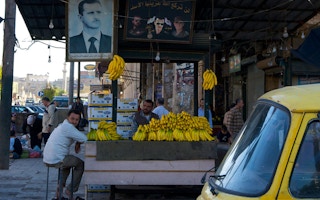In 1984, I gathered the most successful musicians of the time to form a “supergroup” called Band Aid to raise money for famine relief in Ethiopia. The next year, an even larger grouping was formed for Live Aid, a major benefit concert and music-based fundraising initiative that continues to this day. At last month’s International Forum on Food and Nutrition, held by the Barilla Foundation, the enduring—and increasingly urgent—need for efforts to strengthen food security could not be more obvious.
To continue reading, subscribe to Eco‑Business.
There's something for everyone. We offer a range of subscription plans.
- Access our stories and receive our Insights Weekly newsletter with the free EB Member plan.
- Unlock unlimited access to our content and archive with EB Circle.
- Publish your content with EB Premium.
The fate of the Easter Islanders illustrates the world’s current problem. Sometime in the 12th century, a group of Polynesians found their way to a remote volcanic island where dense forests provided food, animals, and the tools and materials to build hundreds of complex and mysterious stone sculptures. But, little by little, the people destroyed those forests, ultimately committing social, cultural, and physical suicide.
Today, in relative terms, we collectively have only a small swath of forest left—and we are rapidly destroying it. We are running out of land to farm, and the desert is spreading. The food we produce is often wasted, while almost a billion people do not have enough to eat—a reality that leaves many with little choice except to migrate.
Most media coverage focuses on refugees fleeing armed conflict (think Syria) or migrants seeking better economic opportunities than they have at home (think Nigeria or Pakistan). But the link between food scarcity and migration is stronger than it might seem to those who are not among the hungry.
“
Will we acknowledge our predicament only when our land becomes a desert, when our health systems collapse under the strain, when even the wealthy are facing food shortages, when freshwater becomes scarce, and when our national shorelines are breached?
For example, the Arab Spring uprisings of 2010-2011, which produced a massive wave of refugees, were triggered by a rise in wheat prices, which led to widespread bread riots that morphed into broader political revolutions. In fact, many armed conflicts, and the mass displacement they cause, can be traced back to food insecurity.
While the poor South starves, the rich North gorges. More than two billion of us are overweight, puffed up by low-energy sugars and mass-produced processed foods rich in fat. According to the Food and Agriculture Organization of the United Nations, just one-quarter of the food we throw out or squander each year would be enough to feed 870 million hungry people. Worldwide, one-third of all crops are wasted. Like the Easter Islanders of the past, we are setting ourselves up for self-annihilation.
Moreover, human-driven climate change threatens to intensify existing pressures affecting food supply and migration. In a report published last December, the European Commission’s European Political Strategy Center predicted that ever-more frequent droughts and floods will “dwarf all other drivers of migration,” with as many as one billion people displaced globally by 2050. Even the lowest estimate of 25 million climate-change migrants, the report warns, “would dwarf the current levels of new refugees and internally displaced persons.”
To be sure, some steps are being taken to address food waste and scarcity. For example, this year, the European Commission proposed cuts in farm subsidies, which contribute to overproduction. But this approach—framed in terms of “evolution,” rather than the “revolution” that is needed—is not even remotely adequate.
The European Union’s common agricultural policy has long been highly problematic. The CAP authorised tax money to be spent on growing surplus food, which was then warehoused (at further cost) and ultimately destroyed (at still further cost). The system has improved somewhat over the years, but not nearly enough. The farm bill in the United States—the federal government’s primary agricultural and food policy tool—is similarly wasteful.
What is needed is not just a politically tolerable adjustment to existing policies, but rather root-and-branch reform that emphasises real results. Unfortunately, it is not clear whether there are any politicians up to the task, whether in the erratic and polarised US or in the ineffectual European Parliament and Commission.
The time to step up was yesterday; the time to adopt a new approach is now. We can discuss the United Nations Sustainable Development Goals—which include targets like “halving per capita global food waste at the retail and consumer level, and reducing food losses along production and supply chains by 2030”—until we are blue in the face. What matters are well-designed, effective, and comprehensive policies, implemented in a sustained manner. And those are nowhere to be found.
The Earth is 45 million centuries old, but our century is unique, because it is the first in which a species could destroy the entire basis of its own existence. Yet we latter-day Easter Islanders seem unaware of this existential threat, preferring to build statues rather than sustainable systems for survival.
Will we acknowledge our predicament only when our land becomes a desert, when our health systems collapse under the strain, when even the wealthy are facing food shortages, when freshwater becomes scarce, and when our national shorelines are breached? By then, it will be too late, and our fate will be sealed.
The greatest threat to our planet is the belief that someone else will save it. Each of us must recognise the seriousness of our situation and demand real action to change it. That means you.
Bob Geldof is an Irish singer-songwriter, author, and political activist. He is the founder and chairman of the Band Aid Trust for famine relief in Africa, and a member of the Africa Progress Panel.
Copyright: Project Syndicate, 2018.
www.project-syndicate.org











